|
School Inspector's Visit
- - - On 31st August, 1840, an inspector by the name of Mr. Patton visited
Drumbo school for the purpose of inspection as requested in April by the
Rev. Montgomery. He completed a report for the application of aid towards
payment of the teacher's salary and supply of books, and in so doing made
the following observations and noted that:
| The school is not in connection with or attached to the Meeting
House; |
| it is sufficiently ventilated and warmed: |
| there are 5 desks and forms attached, with a teacher's desk
and chest for books accommodating 80 pupils; |
| the teacher was Mr. John Bailie, aged 20 years, who had not
received any instruction in the art of teaching but, who was
leaving. A well qualified teacher will be appointed in a few
days; |
| the inscription "National School" will be put
conspicuously on the school house; |
| the General Lesson of the Board will be hung up in the
schoolroom; |
| the books of the Board will be used in the school; |
| the hour from 2 to 3 on Monday to Friday will be
devoted to religious instruction and also one hour on
Saturday; |
| the expected increase in pupil numbers was 40; 25
males and 15 females; |
| He then concluded "the circumstances of this
school are so satisfactory that I would recommend
its immediate adoption by the Commissioners of the
Board." |
Consequently, Drumbo was connected to the National School
Board on 24th September, 1840, and they granted salary to
the teacher John Bailie and monies for text books for 75
pupils. The textbooks employed were issued by direction of
the Board. They were, for the period well illustrated and
bound; and were sold to pupils for a few pence and in
certain necessitous cases given gratis. Because they were in
continual use they were usually passed on from the older
members of a family to the younger, and even from parent to
child.
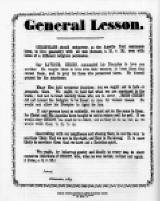 |
Issued from 1835 onwards by the
Commissioners of National Education in Ireland with the
requirement:
'that the principles of the Lesson be strictly inculcated in
all schools
General Lesson
|
Because Drumbo had been out of the National System
of Education, John Bailie, the teacher, had been appointed
by the manager of the school, Mr. Calwell and his salary
would have been paid by the pupils for the instruction he
provided. Following the granting of aid, by the Board, they
paid John Bailie �3.0.0 on 3rd June, 1841, for five months
instruction up to September 1840. The Board also paid
Stewart Carse �2.13.4 for four months instruction during the
same period. During this period the school was closed for
one month "with the permission of the committee"; no reason
for the closure was given. It would appear that Bailie and
Carse taught in the school until Bailie left in October 1842
and, Carse in December of the same year. Carse had been paid
�8.0.0 per annum, paid half yearly. Upon Bailie's departure,
Samuel Graham was appointed to the school and was paid
�4.0.0 on 28th April, 1843 for instruction since his
appointment in October. Records don't show how long Graham
stayed in Drumbo, but in 1848 William Dorman was appointed
as teacher in the school and he remained until he resigned
on 3rd March, 1849. The appointment of Graham's successor
appears to have been a situation fraught with difficulties,
as on 16th May, 1849 the National Education Board received a
resolution from Mr. Calwell, the manager of the school, on
behalf of the school committee, stating that they had:
�Top
...
appointed him as Patron and manager in room of Rev. A.
Montgomery who has resigned." |
The resignation of the Rev.
A. Montgomery appears to have been prompted by the
appointment of George Brydon as teacher in Drumbo on 8th
May, 1849 for whatever reason. The situation was serious enough for the Board to send out
an inspector who, on 4th June, 1849, reported that:
| ". . .
the school had been closed from 3rd March when William
Dorman resigned and was re-opened on 8th May when George
Brydon was appointed." |
The National Education Board was
requested by Mr. Calwell, the manager, to appoint Mr. James
Robinson as temporary manager, from 29th September, 1851
"during my absence abroad for the winter." In spite of the
lack of other denominations in Drumbo, numbers were rising
and an application from Mrs. Bessie Calwell to the Board for
financial assistance for the salary of an assistant teacher
on 29th June, 1861, indicated that the school "was being
enlarged at present," from the initial 27 feet in length to
37 feet. The application goes on:
| "There is only one room
in the schoolhouse used by the three teachers employed
namely - William Watson, Charles L. Horne and Hannabella
Watson (alias Caughey). The application for financial aid is
on behalf of Hannabella Watson, aged 18�
who commenced teaching in Drumbo on 3rd June, 1861, having
taught in Ballymacbrennan as an assistant and work mistress
from May 1859 till 29th September, 1860. She was classed
(III2) by the Inspector. There are 78 males and 54 females
on roll and the average attendance for the last six months
has been 44.9 males and 25.2 females." |
The inspector for
the Board Mr. William Molloy, who replied to the
application, came to Drumbo on 22nd August, 1861 and
included in his report that:
| "The principal is William
Watson II2 and the other teachers are Thomas
Entwistle a probationary assistant, and Hannabella Watson
who is of good character. There are now 94 males and 65
females on roll; the average for the last four months was 46
males and 30 females and there are 89 children present today
- 57 males and 38 females." |
The report concludes that:
| "Owing to the number of girls in attendance a female
assistant is much required. As the average attendance (76)
warrants a second assistant being recognised I beg to
recommend that this application be formally entertained." |
In 1863, the estate owned by Mrs. Calwell on which Drumbo
National School stood, was sold, and the new owner was
Robert Batt of Purdysburn. Anticipating a continuation of
the cordiality extended to them by the Calwells, the Church
Committee did not formally lodge any claim to the school or
its grounds. In so doing they put themselves at the mercy of
the new landlord and his successors for all time.
�Top
However,
the Church Committee was not interfered with in the
management of the school until 1874 when, during a General
Election campaign the manager of the school, Mr. W. J.
Watson, accompanied by the Bailiff, arrived and demanded the
use of the school for the purpose of holding a political
meeting. A member of the Church Committee, who was present
at the time, referred Mr. Watson to a rule of the National
Education Board which prohibited the holding of such
meetings in any school receiving financial aid from the
Commissioners. Thus commenced a protracted and unfortunate
period of time in the life of the school. Mr. Watson did not
take too kindly to such an attitude and promptly served the
principal Mr. Robert Entwistle, with a notice of dismissal.
The Church Committee refused to part with his services,
which he had given since his appointment on 1st August,
1870, and where forced to the necessity of dismissing Mr.
Watson, as manager, and appointing another one in his place.
The Church Committee were then served, by Mr. Batt, with a
notice to give up possession of the school. They refused and
were finally ejected from the premises. The Morning News of
18th February, 1876, gave the following account of their
ejection:
| `On Wednesday last the
Sub-sheriff of the County, accompanied by Mr. Batt's
agent, Mr. W. J. Watson, and the Bailiff, appeared at
the school. The children were summarily dismissed, and
the work of disembowelling the school began in true
earnest. The old forms, carved with many an urchin's
name, were speedily deposited on the public road. The
teacher's desk was dragged after them as
unceremoniously as if it had been tainted with the
leprosy of dissent, and the harmonium, occasionally
uttering a gruff note of remonstrance, was conveyed to
the shelter of an adjoining hedge. Then followed in
quick succession maps and tablets, slates and pencils,
clock and ink bottles, etc. The books were flung into
a capacious bag and conveyed upon the sturdy shoulders
of the Bailiff to the nearest public house, and last
of all, the very fire was "ejected" and its
smouldering embers thrown into a gutter on the
roadside. Meanwhile the simple-minded people of the
village ventured out of doors, and stood watching the
proceedings with feelings of awe and wonder. "Old age
forget its crutch, labour its task," and all ran to
behold the mighty doings of "the office," while now
and then travellers passing that way stopped to make
enquiry, and old men whose geographical knowledge had
become deficient, were afforded the opportunity of
examining the maps and tracing out the locality of the
Suez Canal. At length, when the school apartments had
been thoroughly gutted, and everything movable thrown
out, the Bailiff paused to wipe his heated brow, and
the agent, Mr. William James Watson, stood and looked
around him with the air of a conqueror. Their work was
done. By this time the Sub-sherriff and agent were
moving away, and the onlookers expected that the
Bailiff would also retire from the scene and follow
them at a respectful distance. But in this they were
disappointed. After a brief consultation, the two
former gentlemen returned, and the Bailiff, who had
imagined his toil was over, was ordered to commence
afresh, and to convey the unoffending articles, now
bespattered with mud and slush, back to their former
resting-places in the schoolroom. When with the
assistance of the teacher, who now declares himself
only the servant of "the office," this work was
accomplished, the interesting proceedings terminated,
and the crowd of onlookers dispersed, wondering among
themselves at that which had come to pass, and asking
the ominous question, "what next?" |
Following this eventful day Mr. Watson was left in
undisputed authority as manager of the school. But because
he was not a resident of the district and, consequently
unable to be in a position to discharge his duties, of
manager, appropriately, the Commissioners for National
Education decided to appoint a local manager and suggested
the Rev. W. J. Warnock as being particularly well suited for
the position. However, the new owner of the estate, Mrs.
Way, being an Episcopalian herself, was determined to have
an Episcopalian appointed, despite the wishes of the Board
and the fact that of' the 70 children on roll in the school,
65 were Presbyterian. Subsequently, the Commissioners for
National Education decided to withdraw financial aid from
the school and it closed down, albeit temporarily, in August
1876. With the permission of the Commissioners the school
was transferred to Rokeby Hall, where accommodation was
kindly given by Mr. .I. D. Dunlop, for a period of about two
weeks.
�Top What happened during those two weeks to heal the
rift between the two parties hasn't been recorded but, the
school was reopened by Mr. Batt on 11th September. The
following is the report that Mr. Watson, the manager,
submitted to the National Education Board when he made
application for financial support to be given by the
Commissioners:
| "Drumbo "Mixed" School.
Nearest post town is Lisburn, distant 3 miles west.
The house is in good repair and has been for many
years used as a school house. There is only one room
37 feet by 17 feet. The furniture comprises 10 desks
with seats attached and 4 separate forms all in good
condition. The teaching staff consists of Robert
Entwistle, principal, aged 29, whose salary was �20
per annum, Caroline Entwistle, assistant, aged 22 and
Margt. Milby paid monitor, aged 16. The number of
children on roll was 125 and the average daily
attendance for last year was males 27.7, females 26.3.
Total 54. School hours are from 10 a.m. to 3 p.m.
Religious Instruction is imparted in accordance with
the rules and regulations of the National Board from
10 to 10.30 each morning. The books used for
combined literacy instruction arc those published by
the National Education Board and supplied by them from
their depot in Dublin. Pupils pay between is-ld to
3s-6d which is regulated by the principal. The school
is open for admission of visitors at any time between
the hours of 10 a.m. and 3 p.m. The Patron of the
school is Robert Narcissus Batt, Esq., Purdysburn,
Belfast. The Manager is William James Watson,
Aughavilla Lodge, Warrenpoint. The amount of local
aid independent of sums raised by the Poor Law
Guardians in accordance with the late Act amounts to
about �20 annually. The house is that in which the
Drumbo National School (Ref. No. 2561) was conducted,
and it is now carried on by the same staff of
teachers. The former school was closed by direction of
Mr. Batt on 28th August, 1876, and opened as a new
school on 11th September. Application was made to have
the school readmitted on roll on 14th September, but
no notice was taken of the application till
application was again made on 11th October." |
During this period Mr. Thomas Allen was appointed
Principal in 1883 at the age of 28. He inherited much of
the unpleasantness which had gone before, and which was to
continue until 1896 when:
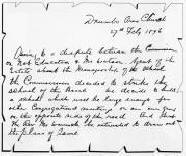 |
Owing to a dispute between the
Commissioners of Nat Education & Mr Watson. Agent of the Estate about
the Managership of the School the Commissioners decided to strike the
school of the board. We decide to build a school which will be large
enough for other Congregational meetings on our own ground on the
opposite side of the road. And that the Rev,. Mr. Warnock be intrusted
to draw out the plans of same. |
Two members of Church Committee were delegated to visit in each
townland to -solicit the members of the congregation for
subscriptions towards the building of the new schoolroom
and lecture hall."
�Top Plans for the new schoolroom and
lecture hall were completed by the end of May 1896 and
tenders were sought immediately. A Committee meeting on
9th July, 1896 considered four tenders for the erection
of the new school. After careful deliberations it was
proposed and passed that the estimate of- Mr. Robert
George of York Lane, Belfast, for the amount of-�520 be
accepted. However, at a meeting of Committee on 20th
August, 1896 the question was posed "How and when are we
going to get money for the new school?" Mr. Thomas
Crawford, a Committee member, offered to lend the money at
the same rate of interest charged by the bank. This offer
was accepted. The building of the new school was rapid, in that most of
the building was completed before the laying of the
foundation stone. The foundation stone was laid on 14th
November, f896, by Miss Rowena Brown, Edenderry.
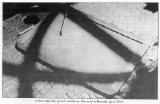 |
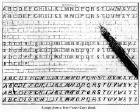 |
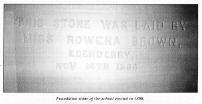 |
|
A slate and slate pencil, similar to that
used in Drumbo up to 1914. |
A page from Vere Foster Copy Book. |
Foundation stone of the school erected in
1896 |
The
following entries commencing with a date, are quotations
gleaned from Drumbo Presbyterian Church Committee minutes
pertaining to the school:
| 15th February, 1897 |
- "It was agreed that
half a ton of coals be got to burn in the new
schoolroom to help to dry it." |
| 3rd October, 1904 |
- "Mr. Thomas Allen was
given liberty to get a stove for the schoolroom
provided he could raise the necessary funds." |
| 5th July, 1909 - |
"When it was unanimously
decided to get the walls of the schoolroom coloured
and the window frames painted." |
| 13th August, 1912 - |
"The Commissioners of
National Education allowed �2 towards heating and
cleaning the schoolroom. It was decided that the
teacher be allowed �1 for lighting and cleaning." |
| 3rd September, 1917 |
- "Rev. Mr. Cordner
reported that a stove was required in the school to
enable the teacher to proceed with the cooking class.
Liberty was given to supply one. Mr. Cordner suggested
that the children attending the school might be asked
to collect from friends so that a considerable amount
of the necessary cost might be raised. Some new desks
were also required - Rev. Mr. Cordner and Mr. Hunter
(teacher) were given a free hand to do what was
necessary. Managers expenses connected with the
appointment of a Principal Teacher for Drumbo N. S.
amounting to �2 was passed unanimously." Mr. William
Todd was appointed Principal in 19f8 at the age of 44. |
| June, 1918 - |
"Mr. Connery was
deputed along with Mr. Todd (teacher) to select the
desks necessary for the schoolroom.
It was unanimously decided that the committee
contribute �1 annually towards the cost of cleaning
the schoolroom and also to contribute �3 annually
(if funds were available) to aid teacher in paying
rent for dwelling house." |
| September, 1919 -
|
"It was also
suggested that the pupils in the day school be
asked to contribute towards the heating of
school." |
| December. 1919 -
�Top |
"A discussion arose
as to how a residence for the teacher could be
secured: Various suggestions were made. It was
finally suggested to build a house for the
sexton and make his (sexton's) house the
teacher's residence." |
6th June, 1920 -
|
"A letter was
read from Mr. Todd (teacher) asking that a
guard be provided for the stove in the
schoolroom, also a press to hold science
apparatus" |
| 11th June, 1921 - |
"The condition of
the lavatory in connection with the day school
was discussed, finally it was agreed that Mr. Cordner was to have a talk
with the teacher concerning the matter. The
Committee to inspect the school grounds to see
if a suitable place can be found for the
erection of a house to hold coke for day
school. That the pupils of the day school be
asked to contribute �5 a year for coke and
coal." |
3rd August, 1924
-
|
"A special
meeting of Committee was held to consider the
advisability of proceeding with the renovation
of the school room during the school holidays.
It was unanimously decided to go on with the
work." |
| 15th February,
1926 - |
"Store in school
to be overhauled. It was suggested that keys
should be got for the organ in school and also
for coke house. Application form signed for
grant from Regional Committee for proportion
of expenses of day school upkeep." |
| 26th April, 1927
- |
"School Inspector
suggested a fire screen for school in
classroom and also that accommodation is not
adequate." |
| 5th March, 1928 - |
"After discussion
it was agreed that the school premises be
transferred to the Education Authorities of
the Government of Northern Ireland." |
| 12th November,
1928 - |
"After
considerable discussion it was agreed to get a
transfer form from the Ministry of Education -
meet on Monday at 8.00 p.m. and try to come to
a decision on the matter." |
| 19th November,
1928 - |
"The school
transfer form from the Ministry of Education
was submitted and read over. After full
discussion some members voted for the transfer
of the school on a ten year lease. Some wanted
absolute transfer and some were neutral." |
| 15th April, 1929
- |
"The agreement
for transfer of Drumbo P.E. School to County
Down Education Authority was submitted and
passed to be signed by the Church Trustees
after approval of the congregation." |
| 23rd
March, 1931 - |
"The
following were appointed as School Management
Committee till July 1932: Rev. J. B. Wallace,
Thomas J. Graham, Joseph Bingham, Robert
Martin, Hugh Shortt." |
| 5th
October, 1931 - |
"Mr. Wallace reported that the sexton, John
Patterson, had been appointed caretaker of
Drumbo P.E. School at 7/6 per week for 52
weeks from 1st September, 1931." |
|
24th February, 1932 - |
"The Agreement, as prepared by Mr. George
Allen, solicitor, was read over. It was
agreed that before getting it signed the
secretary would ask Mr. Allen if the words
"without extra pay" should be inserted
after the sentence "give three whole
days". Mr. Wallace to write Regional
Committee and see if the necessary
alterations required would be made in the
school, or an extension of the lease for
25 years from 1940, and also enquire if an
absolute transfer were made, could the
school be transferred back again on
eighteen months notice, if the conditions
of transfer were not carried out by the
Government." |
|
4th April, 1932 - |
"After considerable discussion it was
unanimously agreed to make an absolute
transfer of the school to the Regional
Committee, and call a meeting of the
congregation after a morning service at
the earliest date and ask their
approval; explain that a clause would be
inserted in the Transfer Agreement
whereby the school would be transferred
back to the church on eighteen months
notice if the Government failed to carry
out any part of the Agreement, or the
premises ceased to be used as a P.E.
school." |
|
9th May, 1932 -
�Top |
"Mr. Wallace reported that the
absolute transfer of the school had
been agreed to by the Regional
Committee."
Following the retirement of Mr. Todd
in 1938, Mr. Robert Morrison was
appointed Principal at the age of 25.
His period in Drumbo included the
evacuation of families, to Drumbo,
from areas of Belfast. This movement
increased, quite dramatically, the
pupil numbers in the school and put
much pressure on what the School
Inspectors of the time where calling
"very inadequate accommodation." |
It was this situation which Mr. Herbie
Currie inherited, when he was appointed
Principal in 1945, at the age of 26.
| 11th
February, 1951 - |
"Giving
notice that foundations had been laid
for a new classroom in the school
grounds, Mr. Miskelly asked if the
Ministry had received official
authority from the church and would
this building, when erected, prolong
the time until the proposed new school
would be built." |
| 19th
February, 1951 - |
"On a
matter arising out of the last
minutes Mr. Wallace outlined the
conditions under which the Ministry
of Education were carrying
out the erection of an additional
classroom. These were:I . These
extensions would have no restraining
influence on the proposed new school
building project.
2. When the Ministry do vacate
the present school building the
church would have the option of
purchasing the extension if they so
desired.
The present Queen's Coronation in
1953 brought celebrations to Drumbo,
when the pupils held a fancy dress
parade. The school also was decked
out with flags and bunting. |
28th
June, 1954 -
|
"After a lengthy discussion on how
best the Session and Committee
could use their influence to
advantage, thus possibly speeding
up the present delays which seem
to exist regarding the erection of
the proposed new school. Members
present expressed the view that a
deputation should approach the
Director of Education, stressing
the point that daily attendances
were still increasing, even to the
extent that a fourth teacher was
shortly to he appointed, and due
to lack of accommodation would
have to occupy the platform."
However it was not until 1959 that
Drumbo was to get the much
promised and long awaited |
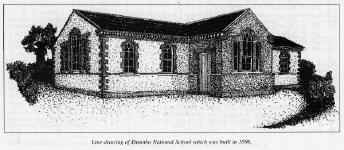 |
|
Line drawing of Drumbo
National School which was built in 1986. |
�Top |